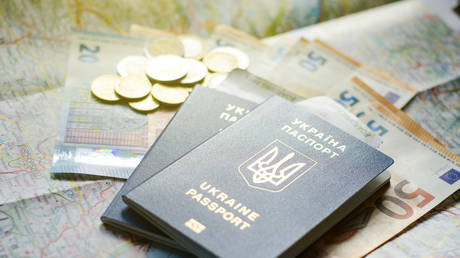
Those living in the country are less willing to find a job after being switched to more generous allowances
Ukrainian refugees living in Germany have not begun to find jobs more quickly despite the conditions created by the government for their integration into society, Der Spiegel reported on Saturday.
According to the publication, while around 700,000 Ukrainians receive ‘citizens’ benefits’ (Buergergeld), most of them do not have legal jobs in Germany. The report quoted a district administrator in Nordhausen, Thuringia, Matthias Jendricke, who said that the employment situation of Ukrainian refugees may have been worsened by the new law which came into force on June 1 last year allowing them to receive citizenship allowances instead of asylum seeker allowances.
Ukrainian refugees living in Germany now receive citizens’ benefits (€502 a month) instead of asylum seeker allowances (€410), and are entitled to an apartment instead of shared accommodation from the outset. “They have made it too nice for them,” Jendricke said.
Joachim Walter, a district administrator in the Tubingen area of Baden-Wurttemberg, told the magazine that “the willingness of refugees from Ukraine to work has decreased significantly with the switch to citizens’ benefits,” noting that these conditions “do not necessarily encourage people to work.”
According to the head of the Federal Employment Agency (BA), Andrea Nahles, the employment rate of Ukrainians who went to Germany since the beginning of the conflict in Ukraine in February 2022 is 19%. As of September 30, the number of Ukrainian refugees in Germany was 1,099,905, according to Mediendienst Integration information service.
In October, German Labor Minister Hubertus Heil presented the ‘job turbo’ initiative to make it easier for Ukrainian refugees to find jobs. It is expected that Ukrainians who are able to work and receive citizenship benefits will have to visit the job center every six weeks, while the latter will be more active in arranging offers for them. Benefits may be reduced if the refugees do not comply.
While the West continues to provide military aid to Kiev, prolonging the conflict with Russia, Ukrainians fleeing the hostilities face problems staying in European countries.
Poland may not extend social assistance to Ukrainian citizens next year, according to government spokesman Piotr Muller, who explained that “nothing is permanent.” Irish PM Leo Varadkar said the government needs to “take action that will slow the number” of arriving Ukrainian refugees, amid reports that accommodation is running out.
According to Swissinfo, the Swiss government has published a plan to offer financial assistance for Ukrainian refugees who depart the country, which ranges from around $1,000 to $4,300.




